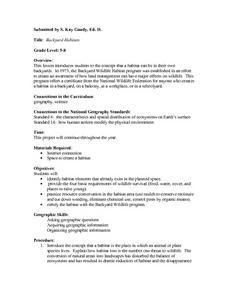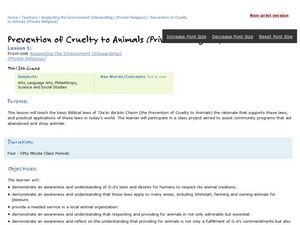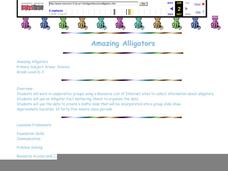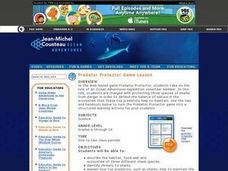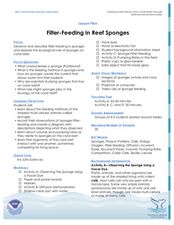Curated OER
Backyard Habitats
Students identify habitat elements. They create a habitat in a backyard, on a balcony, at a workplace, or in a schoolyard and provide the four basic requirements of wildlife survival (food, water, cover, and places to raise young). They...
Curated OER
Technology: Recipes Around the World
Students research international cuisine and create Web pages based on them. Once they have organized their findings, they demonstrate their research with a multimedia presentation. The project concludes with a party using food ...
Curated OER
Glucose
Young scholars conduct various experiments on glucose. In this biology lesson, students differentiate the process of diffusion and osmosis. They test different foods for the presence of glucose and starch.
Curated OER
Emergency Preparedness
Students are introduced to governmental and humanitarian responses to disasters. They research organizations such as FEMA and the Red Cross. They examine their local National Guard unit as well.
Curated OER
Making a Mini Worm Habitat
Students explore the process of converting organic waste into usable fertilizer. They observe how living and nonliving things interact with one another by making a mini-worm habitat.
Curated OER
What Happens When You Eat?
Students explore digestion. In this Human Body lesson plan, students participate in six different activities pertaining to the Digestive System. Students gain understanding of digestion through experimentation and investigation. Students...
Curated OER
Mini-Ponds
In this mini pond worksheet, students create a mini-pond ecosystem with soil, water, and plant life. Students let their ecosystem sit for a day and they observe a sample the next day. Students identify all the pond water microorganisms...
Curated OER
Swimming With the Crabs
In this expository writing worksheet, students read an article about crabs and a graphic organizer with crab facts. Students fill in a graphic organizer, including their specific topic about crabs and details to support their topic.
Curated OER
Prevention of Cruelty to Animals (Private-Religious)
Students examine how to prevent cruelty to animals. For this stewardship lesson, students discover the Biblical laws of Tza’ar Ba’alei Chaim. Students volunteer their time to assist community organizations that promote animal welfare.
Curated OER
Mutualism and Co-evolution A study of Flowering Plants and their Pollinators: Biology, Plants
These lessons use a variety of methods and approaches to teach flowering plant biology which includes seed germination; plant growth and food production through photosynthesis; plant transpiration and respiration; sexual reproduction...
Curated OER
Regional Landforms and Native People
Third graders study the Native American tribes of Maidu and Miwok by studying Internet artifacts, culture, language, music, storytelling, architecture, food, clothing, crafts and geology.
Curated OER
Amazing Alligators
Students uncover facts about the alligator: including but not limited to habitat, characteristics, food, traits, habits, offspring and interesting facts.
Curated OER
What's Bugging You?
Students examine the effects of pests on other organisms, crops, and the environment. they construct an insect observation chamber and discover how some insects can be pests in some situations and beneficial in others. They write "pest...
Curated OER
December Holidays:Create A Comparison Chart
How are Christmas, Chanukah, Kwanzaa, Las Posadas, and Ramadan similar? How are they different? Learners research the different December holiday celebrations around the world and compare the dates, symbols, countries, foods, and...
Curated OER
Predator Protector Game
Students take on the role of an Ocean Adventures expedition volunteer member and are charged with protecting three species of sharks from danger in order to defend the balance of nature in the ecosystem. They play an online game which...
Curated OER
Habitats and Adaptations
Students research and describe the habitat and adaptations of a reef animal. After the student is assigned a habitat, they design and draw a cresture adapted to eat each food and to live in each habitat.
Curated OER
Proteins from Plants to People
Learners participate in a scientific activity to identify the building blocks for proteins (amino acids) that are needed to grow. They identify foods that contain proteins, how they are digested and rearrange the building blocks. They...
Curated OER
Where In the World is the Dominican Republic?
Students begin the instructional activity by discussing how where they live affects how they live. As a class, they add examples to each category such as home types, clothing, jobs and food. Using those categories, they write about...
Curated OER
Topography of Africa
Students study Africa's diverse landscape and investigate how these features impact the available water supply, food sources, and population distribution of the continent. They compare topographical features and
their affect on each...
Curated OER
What Do I Know About Islands
In this island research worksheet, students fill in a graphic organizer about the island of their choice. Students fill in two tables with advantages and disadvantages of living on the Rathlin Island and Hallig Oland. They write a...
Curated OER
Healthy Colon with Good Digestion and Fiber
Sixth graders learn about the colon and what it does. In this lesson about digestion and the colon, 6th graders analyze what this organ's job is. Students complete four activities where they explore the importance of fiber, the makeup of...
Curated OER
Dissecting Owl Pellets
Students explore owl pellets. In this animal science lesson, students use owl pellet dissection kits to dissect one owl pellet. Students use a magnifying glass to identify the foods that the owl ate.
Curated OER
Filter Feeding in Reef Sponges
Learners investigate the role of sponges in our oceans. In this biology lesson, students create a diagram visualizing how sponges bring food into their bodies through a filtering process. Learners discuss the connections...
Curated OER
Family Tree
Students create a family tree in this culminating activity to their family unit. In this family tree lesson, students extend their learning about the family unit by working in small groups to develop a three generation family tree. They...
Other popular searches
- Con Pair Organic Foods
- Organic Foods Taste
- Non Organic Foods
- Com Pair Organic Foods
- California Organic Foods
- Compair Organic Foods
- Conpair Organic Foods
- Organic Foods Lesson Plan
